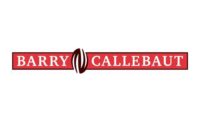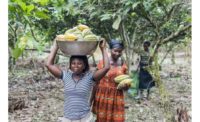Two leading women in Côte d'Ivoire's cocoa industry recently visited Barry Callebaut at the world's largest chocolate factory in Wieze.
Marie Zae Zea and N’Goran née Brou Oussu, two female cooperative managers from cocoa plantations in Côte d'Ivoire and both members of the National Federation of Women Producers of Coffee and Cocoa Côte d'Ivoire, were invited to visit Barry Callebaut and discuss the challenges they've faced on the ground.
The goal of the visit was the share the endeavors that both women undertake to improve the livelihoods and working conditions of women in Western Africa.
“Barry Callebaut is happy to have the opportunity to bring people together and providing a forum to share knowledge and expertise. Strong women such as Mrs. Marie Zae Zea and Mrs. N’Goran née Brou Oussu are a great inspiration, not only for us, but for everybody," says Erika De Vos, HR director of Barry Callebaut Belgium. "They show that there is a way for women in the cocoa industry to be financially independent, and to be strong and proud."
Their visit started with a tour of Barry Callebaut's R&D application lab and production site in Wieze. They received glimpses of the future of chocolate through presentations on the innovation projects of the Barry Callebaut Group, and visited Callebaut's flagship Chocolate Academy Center to learn how chocolate makers in Wieze have been turning cocoa beans into chocolate since 1911.
The two women belong to key elements that drive women's empowerment in Côte d'Ivoire, the world leader in the production and export of cocoa beans. They are role models in a country where tradition and culture still dictate women's roles in the family.
Land ownership, for one, can be problematic. It's not uncommon for a plantation to be handed over to the husband's family if he dies, causing women to lose their homes and livelihoods.
Zae Zea and Brou Oussu fight injustices like these. They shared their experiences and discussed how they want to empower women by improving public understanding and convincing husbands to hand over parts of their land to their wives, in the hopes that these efforts will improve the livelihoods and working conditions of women in Western Africa.
Their goals and efforts align well with those of Barry Callebaut, which takes a long-term approach to creating a sustainable cocoa industry. The company works with farmers to improve cocoa farming practices while safeguarding the environment and address social challenges in the communities. With this combined approach, Barry Callebaut hopes to unlock the greatest potential to increase productivity, household incomes, and improve communities.
Barry Callebaut also lobbies for women's empowerment by including them in training, farmer group administrative and management activities, and other business development opportunities. It also supports literacy, business skills training, and working with women to create more income-generating opportunities.
“Barry Callebaut fully supports women empowerment activities, and wants to give role models like Marie Zae Zea and N’Goran née Brou Oussu a forum to share their knowledge and expertise. People like them inspire us and are key to making the cocoa supply chain more sustainable,” says De Vos.





